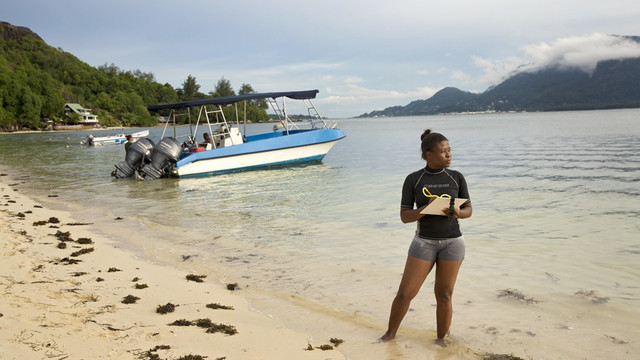The third woman – getting trade back on track
The World Bank-International Monetary Fund Spring Meetings sent promising signals of the international financial system overhaul, urgently needed to tackle the debt-climate-nature crises – and women are leading the charge.


From left to right: IMF managing director Kristalina Georgieva, Prime Minister of Barbados Mia Mottley and WTO director general Ngozi Okonjo-Iweala (Photos in order: World Bank, CC BY-NC-ND 2.0; UNDRR/Antoine Tardy, CC BY-NC-ND 2.0; IISD/ENB - Angeles Estrada Vigil, CC BY-NC 2.0)
Returning home from the Spring Meetings of the World Bank and International Monetary Fund (IMF) in Washington earlier this month, I reflected that we are at last seeing some international leadership on the triple crises of debt, climate change and nature loss. And it’s coming from women.
Kristalina Georgieva, the IMF’s managing director, is championing more support for highly indebted poor countries, including through debt for nature and climate swaps.
Prime Minister of Barbados Mia Mottley is leading the Bridgetown Agenda, calling for reform of the multilateral financial system to provide more support for vulnerable, low-income countries to deal with the climate crisis and inequality.
Commanding the stage, these women stood out literally – as well as figuratively − from the summit’s sea of predominantly grey-suited men.
Shake-up
Vigorous reform within these powerful organisations will be fundamental in addressing the triple crisis. But to date, a third major multilateral institution, the World Trade Organisation (WTO), has been less explicit in the changes it will make and role it will play.
That could be about to change with WTO’s director general Ngozi Okonjo-Iweala pushing to incorporate climate change and sustainability concerns into the organisation’s rule making. Such reform would give major support to the shake-up in international financial systems being advocated by Georgieva and Mottley.
Global financial challenges
Low-income countries are increasingly struggling to service their debt. In analysis conducted ahead of the Spring Meetings, my colleague Sejal Patel calculated that, on average, low-income countries are using more than 10% of their national budget to service debt, with some – Senegal (35%) and Angola (46%) – using much more.
Institutions including the World Bank, IMF, International Finance Corporation and regional development banks are coming under increasing pressure to set out how they will help resolve the mounting debt problems of poorer countries.
And on the margins of the meetings, Ghana’s finance minister Ken Ofori-Atta highlighted the failings of the World Bank and other multilaterals at this crucial time. Ofori-Atta said the system was failing to address the problems of inequality and climate change "at the scale and speed that is required".
Global trade challenges
It was always envisaged that the WTO would contribute to sustainable development. In its preamble, the 1995 Marrakesh Agreement that established the organisation contains a strong statement that the WTO will uphold “an open, non-discriminatory and equitable multilateral trading system… acting for the protection of the environment, and the promotion of sustainable development”.
However, in reality the role of the WTO has been contentious − something I saw first-hand when working in trade and development policy in the early 2000s. For example, rules designed to prevent products being treated differently in terms of trade taxes based on how they were produced has meant that countries cannot discriminate between imports produced with clean energy versus fossil fuels.
Such rules that seem to favour rich countries have been resisted by many low-income countries fearing a new ‘green protectionism’ and there has been limited discussion and progress on the issues among members.
The WTO’s committee on trade and environment – set up to examine the relationship between trade and the environment, to promote sustainable development − only meets twice a year and has made limited progress. This, coupled with the slow progress on concluding new trade agreements, has led to a sense that the WTO lacks relevance in efforts to tackle the current crises.
Promise
Okonjo-Iweala’s arrival in 2021 began to shake things up. Informal discussions on trade and environmental sustainability launched in 2020 have grown to include 74 member countries, covering how to make progress on: subsidies, circular economy, environmental goods and services, and trade-related climate measures.
And in June last year an historic agreement was reached prohibiting harmful fisheries subsidies, which are a major cause of depleting global fish stocks. This was the first WTO agreement to focus on the environment and marks a major step towards achieving UN Sustainable Development Goal 14 on ‘Life below water’ – although it is only the second agreement reached at the WTO since it was created.
The atmosphere at the Spring Meetings was of an approaching tipping point for low-income country economies, global climate change and nature loss.
Contributions from the world's most powerful trade and finance institutions on how to solve these crises is in no small part due to the women leading it and the fact that Georgieva, Mottley and Okonjo-Iweala are operating in environments that remain predominantly male clearly gives them a strong bond and potential to work together to change the system.
IIED is conducting research to better understand how international trade rules can support, or undermine, sustainable development. As part of this I will be following closely the progress of these three impressive women leaders – and willing them on to succeed.




